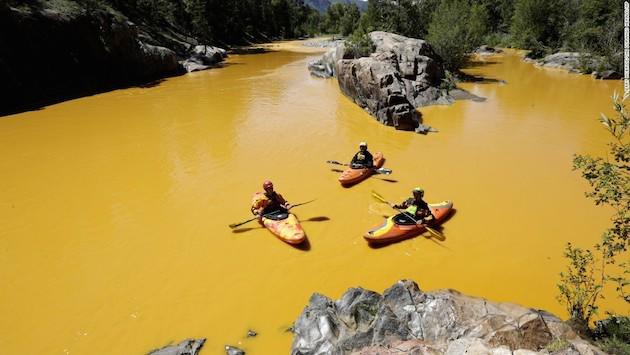The water in the Animas and San Juan rivers is a sickly orange color following the Gold King mine disaster. Incredibly high levels of heavy metals, including mercury, lead, and arsenic, were released when the mine burst August 5, but a report from USA Today’s Trevor Hughes said fish were already in trouble before the spill.
On Wednesday, Hughes reported that Concrete Creek, a stream that suffered heavily from the recent spill, was so acidic before the incident that fish could not live there. Though major leaking has made matters much worse, the fisheries affected were already suffering from mine waste.
“This is not just an isolated problem. There are mines like this all over the West,” Roger Flynn, an adjunct professor at the University of Colorado Law School in Boulder, told USA Today. “If there’s a silver lining, it’s that people are starting to say, ‘wait a minute ….’”
The already dangerous situation for fish was made even worse by the Gold King waste release. An Environmental Protection Agency-supervised crew was working at the abandoned mine to pump the liquid waste out when debris covering the mouth of the cave burst. The heavy metal-laden waste spilled out into the Animas and later the San Juan rivers, flowing from Colorado to Utah and New Mexico. Gold King’s waste contained a cocktail of harmful substances, including mercury, arsenic and lead.
Map of river spillage from Gold King mine. (Photo courtesy of CNN)
The EPA accepted responsibility for the incident and said the crew had misjudged the pressure behind the cave debris. When they inserted a metal rod through the top of the cave to remove the waste, too much rock was removed and the pressure was triggered, causing the blowout.
EPA officials initially put the spillage at one million gallons, enough to fill an Olympic-size swimming pool more than four times. The US Geological Survey revised that number, estimating spillage at three million gallons.
The expected cost for cleanup has been put at $100 million, though the mine was still spilling waste as late as August 11.
Colorado law requires that mines establish a bond in case of a disaster like the Gold King spill, but the mine has been abandoned since 1923, before the law was in place.
The EPA has vowed to pay for the damage caused, which stretches across three states and has effected farmers, rafting companies, and Navajo living on the Navajo reservation. The tribe had recently finished negotiations to allow it access to river water for drinking, but that remains doubtful in light of the spillage. The reservation’s underground water table is already contaminated by metal, leaving them few options for acquiring drinking water.
Trout Unlimited has monitored the rivers since the spill and said the well-known trout fishery in the Animas was imperiled by the spill.
“This toxic spill into the Animas is a shocking incident that underscores how vulnerable our rivers, streams and fisheries are to abandoned hardrock mine pollution,” said Steve Kandell, director of TU’s Sportsmen’s Conservation Project. “Trout Unlimited will be monitoring the situation in coming days to assess the impact to our waters and world-class trout fishery in the Animas River. Needless to say, the health of our local community and recreation-based economy depends heavily on water quality. This is a wake-up call to Coloradans and the nation on the need to find solutions to abandoned mines.”
Colorado law requires that mines establish a bond in case of a disaster like the Gold King spill, but the mine has been abandoned since 1923, before the law was in place.
The EPA has said the effects of future flooding could release the contaminants that have settled in nearby soil, but at a much lower risk of damage.
Hydrologists say different.
“There will be a source of these contaminants in the rivers for a long time,” hydrologist Tom Myers told the Associated Press. “Every time there’s a high flow, it will stir it up and it will be moving those contaminants downstream.”
Trout Unlimited is continuing to push for mine reform following the spill. Without changes in the way mines, especially disused mines, are handled, fisheries are in a constant state of danger from potential leakage.
“Abandoned mines are a cancer threatening the health of rivers and streams in southwest Colorado and many other areas of the West,” said Ty Churchwell, Colorado backcountry coordinator for Trout Unlimited. “If we do nothing, we’re inviting more catastrophes like the Animas spill. It’s time for action.”
Cover image: Associated Press

